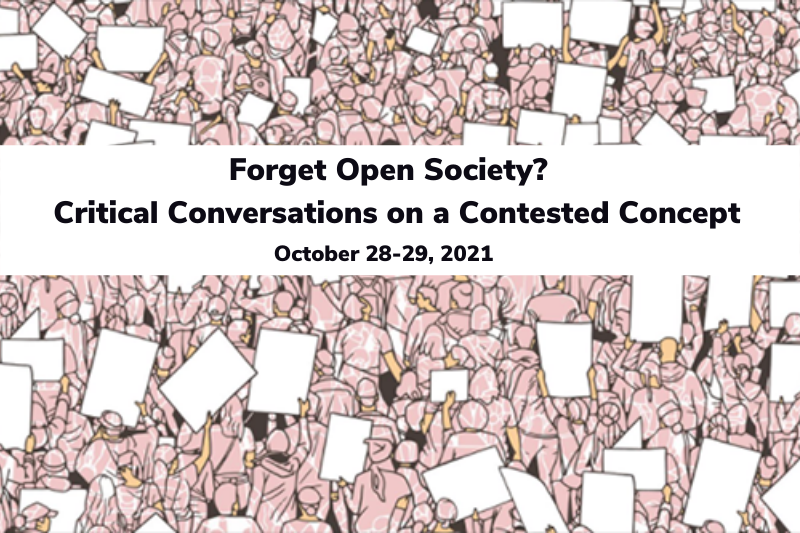
Forget Open Society? Critical Conversations on a Contested Concept
October 28-29, 2021Conference Program
On October 28-29, 2021, the Open Society Research Platform convenes "Forget Open Society? Critical Conversations on a Contested Concept" to explore further avenues for research on the idea of Open Society in regional, national, international, and global contexts.
This conference seeks to bring together and spark conversations between scholars, thinkers, and activists from various disciplines who will critically reflect on this contested concept and probe its potential and limitations in light of the global challenges that humanity faces.
(*all times refer to Central European Time)
Thursday, 28 October
9.00 - 9:30 Welcome Address
9:30-10:30 Presentation of the OSRP Report
10:30-11.00 Coffee Break
11.00-12.30 Panel 1: Opening Spaces
Chair: Liviu Matei (Central European University)
Discussant: Prem Kumar Rajaram (Central European University)
Rachid Boutayeb (Doha Institute for Graduate Studies), “Neighborhood and its Enemies. Plaidoyer for an Open Migration”
Nwankwo Tony Nwaezeigwe (University of Nigeria), “The Home as a Contested Open Society Phenomenon in African Cosmology”
Nazam Laila (BRAC University), “OSUN’s Role in Decolonising the Cyberspace”
11.00-12-30 Panel 2: Higher Education, Sustainability and the Open Society
Chair: Eduard Lezcano (Central European University)
Discussant: Saimum Talukder (BRAC University)
Maryna Lakhno (Central European University), “Aligning Open Society Ideas and the Sustainable Development Goals”
Helen Murray (University of Sussex), “In Search of ‘Publicness’ in an Open Society: Universities and the Public Sphere”
12.30-13.30 Lunch break
13.30-15.30 Panel 3: The Value of ‘Openness’
Chair: Christof Royer (Central European University)
Discussant: Anna Eva Grutza (Central European University)
Gazela Pudar Draško and Predrag Krstić (both University of Belgrade), “Don't Forget the Openness”
Mark Bovens (University of Utrecht), “The Open Society and its Challenges”
Thom Scott-Phillips (Central European University), “The Value of Open Discussion: An Evolutionary and Cognitive Perspective”
John Thrasher (Chapman University), “The Distinctiveness of Open Society”
13.30-15.30 Panel 4: Narratives, Identities, and Open Society
Chair: Valida Repovac Niksic (University of Sarajevo)
Discussant: Heather Grabbe (Open Society Foundations)
Gregory Joseph Lobo (Universidad de los Andes), “Identity and the Open Society”
Lubomir Terziev (American University in Bulgaria), “’Sorosoids’ Can Serve as They Swerve: Open Society in Contemporary Bulgaria”
Katalin Fabian (Lafayette College), “The Gender of Illiberalism: New Transnational Alliances in Central and Eastern Europe”
María José Montoya (Universidad de los Andes), “Moralizing as an Enemy for the ‘Openness’ of Colombian Open Society”
15.30-16.00 Coffee Break
16.00-17.30 Keynote Lecture
Iveta Silova (Arizona State University): Education and Open Society
17.30- Online Socializing
Friday, 29 October
9.00-10.30 Keynote Lecture
Thaddeus Metz (University of Pretoria): African Philosophy and Open Society
10.30–10.45 Coffee Break
10.45-12.15 Panel 5: Covid-19 and AI
Chair: Christof Royer (Central European University)
Discussant: Maryna Lakhno (Central European University)
Nahida Akter (BRAC University), “Gender and Public Policy Responses to Covid-19: Emerging Evidence from Bangladesh”
Saimum Reza Talukder (BRAC University), “Rights Based Use of Artificial Intelligence: A Way Out to Reduce Risks against Open Society in a Post-COVID World?”
10.45-12.15 Panel 6: Knowledge Production in Open Society
Chair: Milica Popovic (Central European University)
Discussant: Lubomir Terziev (American University in Bulgaria)
Anna Grutza (Central European University), “The Historian as Scientific Prophet: The Danger of Sherman Kent’s and the CIA’s Scientific Method of Prediction and Data Evaluation to Open Societies”
Friedrich von Petersdorff (Independent Scholar), “Interpreting the Historical Past When Aiming at an Open Society”
Nazam Laila and Adeeba Asri (both BRAC University), “The Deconstruction of the Masculine Bias in AI Discourse: OSUN’s Roles and the Way Forward”
12.15-13.30 Lunch break
13.30-15.00 Panel 7: Open Society Beyond (and Against) Popper
Chair: Tatiana Schyttsova (European Humanities University
Discussants: Jean-Luis Fabiani and Christof Royer (both (Central European University)
Jean-Louis Fabiani (Central European University), “Can Bergson’s Definition of Open Society be Useful Today?”
Andrea Timár (Eötvös Loránd University),“Reading with Hannah Arendt: Literature and Open Society”
Piers Norris Turner (Ohio State University), “Open Society as an Achievement”
13.30-15.00 Panel 8: The Global Rise of Authoritarianism
Chair: Volha Biziukova (Central European University)
Discussant: Katalin Fabian (Lafayette College)
Ahmed Hmeedat (Al Quds Bard College), “The Reception of the Concept of Open Society in Palestine: The Rise of Authoritarianism and the Decline of the Individual”
Kenneth Ka-Lok Chan (Hong Kong Baptist University), “The Relevance of Open Society to Hong Kong’s Fight against Moral and Institutional Decay”
Georgios Samaras (King’s College London), “Golden Dawn’s Visual Diary – An Analysis of Content shared by Greek Extremists on YouTube from 2012 to 2019”
15.00-15.30 Coffee Break
15.30 – 17.00 Keynote Roundtable: Open Society and Covid-19
Albena Azmanova (University of Kent), Michael Esfeld (University of Lausanne), Shalini Randeira (Central European University), Tarun Weeramanthri (University of Western Australia), Christof Royer (moderator, Central European University)
17.00 – 17.10 Closing Remarks
Cross Reference: Conference,Opportunities,Human Rights
Deadline Expired on October 29, 2021